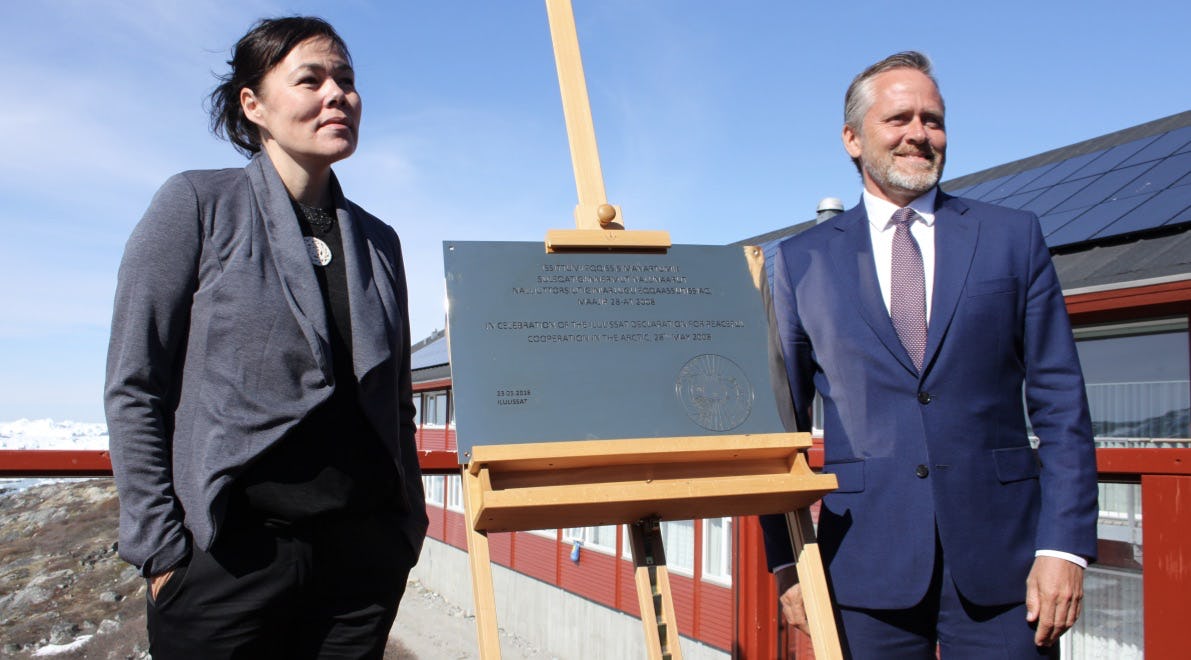Greenland’s Arctic Advantage

Greenland’s and Denmark’s then respective Ministers of Foreign Affairs (Vivian Motzfeldt and Anders Samuelsen) co-hosted the Ilulissat Declaration’s 10-year anniversary in May 2018. Photo: Marc Jacobsen
This is the introduction to the article ‘Greenland’s Arctic advantage: Articulations, acts and appearances of sovereignty games’ recently published in Cooperation and Conflict. The full article can be accessed below.
In the Arctic, nation states and the Inuit Circumpolar Council (ICC) disagree whether the rightful meaning of ‘sovereignty’ is either a fundamental binary concept or a contested concept in flux. As a state-in-the-making with almost 90% of its population being Inuit, Greenland is situated between those two oppositions. On the one hand, their self-government is part of the transnational Inuit community while it, on the other hand, aspires to become a state in the traditional sense with full formal Westphalian sovereignty. In this striving, the development of more foreign policy sovereignty is an important factor in the enhancement of Greenland’s international status and in their ability to attract external investments. The governmental arrangement with Denmark allows the Government of Greenland some foreign policy competence on areas of exclusive concerns and which entirely relate to fields of responsibility that Greenland has taken over. As this definition is open to interpretation, it gives rise to the question: How do representatives expand Greenland’s foreign policy room for maneuver by playing sovereignty games in the Arctic?
In attempting to answer this question, it is relevant to take into consideration the renewed geopolitical interest in the Arctic region, welcomed by changing Greenlandic governments as an opportunity for establishing new international relations in their aim to loosen dependence on Denmark. Meanwhile, the Arctic has also become one of Denmark’s top-five foreign policy priorities, causing a somewhat reverse dependency as Greenland’s geographic location and membership of the Danish Realm is the only thing legitimizing Denmark’s Arctic state status. This gives Greenland an ‘Arctic advantage’ in negotiations with Denmark, while making circumpolar events well-chosen strategic arenas for playing sovereignty games seeking to move the boundary of what Greenland may do internationally without Danish involvement. Following the tradition of analyzing foreign policy as discourse and praxis, this article investigates how Greenland representatives make use of the international Arctic interests and Greenland’s geostrategic location to articulate, act and appear a more sovereign position in international politics. In contribution to the sovereignty games literature, this article will make use of ethnographic observations from central Arctic related events, hence showing how otherwise undocumented empirical data may reveal more latent moves in the sovereignty game. In a broader perspective within the study of International Relations (IR), this article will also contribute to the understanding of quasi states’ international roles which too often are treated by mainstream IR as having no separate agency.
As the analysis will show, Greenland’s foreign policy sovereignty is successfully enhanced via outspoken discontent and tacit gestures in the Arctic Council, at the high- level meetings in Ilulissat and at circumpolar conferences, highlighted by shifting Greenlandic governments as some of the most important foreign policy arenas. Before turning to the analyses of these three cases, the analytical strategy of how to study sovereignty games will be explained, followed by a brief introduction to Greenland’s official foreign policy competence and international priorities as stated in the Self-Government Act and the Foreign Policy Strategy.